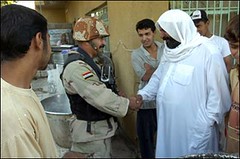BAGHDAD — Let’s put the bad news up front: Extremist elements in Iraq are vying for political and economic power and are seeking to take advantage of this delicate stage of transition in Iraq’s history. Sunni and Shia extremists are using brutal and provocative tactics against one another. Baghdad is the center of gravity for this increasingly sectarian conflict. The conflict is complex: There are also foreign terrorists infiltrating the borders, renegade death squads, an insurgency, and foreign governments who seek to exert influence on Iraqi politics.
This, however, is only part of Iraq’s present story. The violence belies the gradual but remarkable transformation this nation is experiencing. Focusing on just violence would miss telling the bigger story of how — despite it —Iraqis have made enormous steps toward self-sufficiency in both the security and political realm.
Three years ago, there were virtually no security forces in Iraq. Today - Iraqis are standing up military and police forces that number over 300,000. In coming months, the Coalition and the Iraqi government will reach the goal of 325,000 trained and equipped force members. {Click on image for photo details}

1 comment:
Quality is improving with quantity. In April 2004, almost all Iraqi forces fled in the face of a militia uprising in Najaf. This August, when militia attacked an Iraqi Army outpost in Diwaniyah, the Iraqi army counterattacked and killed 50 militiamen in the ensuing battle. By the end of August, Iraq’s special-ops brigade, with U.S. combat advisers, had netted 1,320 detainees in 445 operations all over the country this year, including three senior militia leaders and 20 most-wanted individuals. This month, Iraqi forces provided a safe environment for more than four million Shiite pilgrims celebrating the birth of the 12th Imam. And it was Iraqi forces operating independently who recently captured a major Al Qaeda in Iraq
A functioning command structure leader, Abu Hammam
This month, Prime Minister Nuri al-Maliki became commander-in-chief of Iraq’s military in more than name only. That is, the Ministry of Defense and the Joint Headquarters –who report to the prime minister—assumed operational control of the Iraqi Ground Forces Command, Navy and Air Force. Before Sept. 7, Coalition Forces exercised control of all of Iraq’s military. Now, two of Iraq’s 10 Army Divisions fall under this command structure. More will soon follow.
Of Iraq’s 10 Army divisions, six division headquarters are “in the lead” in their areas of responsibility, which means they are capable of coordinating, planning, and executing security operations independent of Coalition forces. Twenty-six brigades and 88 battalions have this operational lead as well.
Healing a fractured society
Security will only improve with simultaneous political and economic progress. Under Saddam, government served the will of the dictator and primarily served one sect. Today, Iraqis are learning to share power and wealth. Local governments—from provinces, districts or neighborhoods—are beginning to take responsibility for their citizens. The government must work to heal the wounds of this fractured society by getting all factions to reconcile. Leaders must promote laws that encourage investment and provide jobs. Recent initiatives show Iraqis meeting these challenges head on.
In Baghdad, several hundred Iraqi civil society representatives renounced violence this past weekend at the second of four conferences that are part of Prime Minister Maliki’s overall 24-point national reconciliation and dialogue plan.
On Sept. 21, the governor of the southern province of Dhi Qar took over civilian responsibility for security from Coalition Forces. Dhi Qar is the second of 18 provinces to take over civil control, and several more should meet the transition criteria before the year’s end.
The Iraqi government met with representatives of neighboring and European countries to form an “International Compact,” aimed at getting help to transform Iraq's economy. At the Sept. 10 meeting, Iraq pledged economic reforms in exchange for greater international support.
Several hundred companies from over 20 different countries attended the third annual international expo, held last weekend in Erbil aimed at promoting international investment.
Iraq’s new unity government is moving forward and will continue grappling with tough political challenges, such as: how to balance power between central and regional governments (federalism); how to divvy up the country’s oil revenues (a hydrocarbons law); how to assimilate former members of Saddam’s Ba’ath party (de-Ba’athification) and integrate and/or disarm militias. But Iraqis have succeeded in setting a road map for resolving these essential issues. Likewise, there is still significant work to be done in developing the security forces so they are capable of defending a democratic Iraq from both internal and external threats. But for such a young force, their advances have been impressive.
Iraq is living a critical moment in what Iraqis, and all our allies supporting the mission here, hope is the beginning of a long history of democracy for both this nation and the region. The process may seem arduously slow for Americans –who value expediency and want our beloved service members out of harm’s way—and for Iraqis, many of whom live the violence daily. Iraqis have many difficult choices to make to bring unity, security and prosperity. As Iraqis persevere, we must maintain the patience to allow their critical efforts come to fruition.
Editor’s note: Maj. Gen. William B. Caldwell IV is spokesman for Multi-National Forces-Iraq and is currently stationed in Baghdad.
Post a Comment